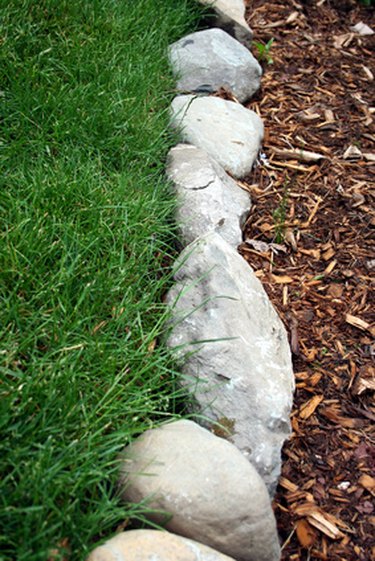
Homeowners have many challenges to meet in trying to maintain their yard and home. Weeds, water use and pest control are high on the list. Sometimes the solution to one problem can cause another. Mulches are often used in attempts to control weeds and limit water use, yet many common mulching materials can attract house-destroying termites.
Benefits
Video of the Day
Mulching is beneficial for many reasons. It slows moisture loss from the soil, helping plants survive in dry weather and lessening the need to water. It also keeps soil in good condition, preventing erosion and crusting. A good mulch will smother weeds, and any straggly stems that do grow through your mulch are easy to pull. Mulch also keeps soil at a more even temperature, protecting it from light frost and extreme heat. This can help extend your growing season somewhat.
Video of the Day
Types
Many different materials are used for mulch. Inorganic mulches such as landscape cloth, plastic sheeting and gravel have their own benefits and problems. These are often chosen in desert climates where water conservation is critical. Organic mulches, such as straw, bark, leaves, compost, grass clippings and pine needles are easy to find, and they all add nutrients to your soil as they slowly degrade. Wood chip or bark mulches are popular for use around house foundations because of their attractive color and uniformity of appearance.
Considerations
Both inorganic and organic mulches can attract insects. That is not all bad, unless the mulch is up against your house and the insects attracted are termites. Inorganic mulches keep the soil under them moist, which insects, including termites, like. Organic mulches provide moisture and food for insects. Termites "live in the soil and they eat wood" Barbara Ogg at the University of Nebraska Cooperative Extension reminds us. So putting a wood mulch on the soil, right next to your house can be a bad plan.
Theories/Speculation
Some woods are thought to be more insect resistant than others, and this is borne out by research. In the University of Florida reference below is an analysis of a study done comparing how well termites survived with only certain types of wood available to eat. This study and Ms. Ogg agree that mulches "made of redwood, cypress or cedar will be somewhat termite resistant." These would definitely be better choices than any kind of pine, which termites love. However, she says that the oils that make cedar and similar woods insect resistant eventually leach out of the wood, and then termites will eat them just like any other wood.
Recommendations
Use mulches in your garden and landscaping to get the benefits they provide. An Ohio State University Entomology Fact Sheet recommends keeping "mulch levels several inches below the siding and wooden parts of the structure" and to avoid wood mulch next to your foundation. If you choose a wood mulch, consider using cedar, but realize that any wood's insect resistant properties will eventually dissipate, so that you will need to replace the mulch periodically.